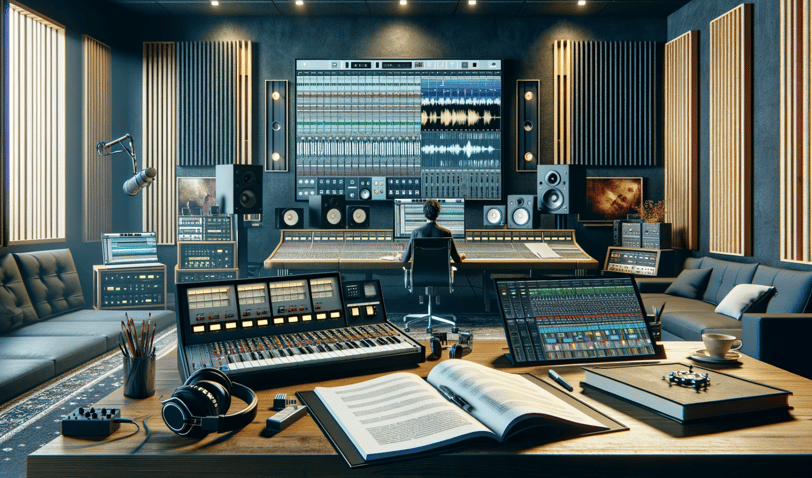Securing Your Creative Freedom
Understanding Copyright and Royalties in Music Production
6/6/20244 min read


My post contentCollecting Your Royalties: The Intricacies
Collecting royalties, especially for independent musicians, can be a complex maze. Here are some key considerations:
Registering Your Works: Registering your compositions with a PRO ensures they track your music's usage and collect royalties on your behalf.
Understanding Royalty Splits: If collaborating with other artists or producers, clearly define royalty splits in a written agreement before releasing your music.
Royalties Collection Services: Companies like [Your Royalties Collection Service Name] can help you navigate the complexities of royalty collection, offering services like international registration and royalty tracking.
Contracts: Safeguarding Your Rights
Whenever working with producers, labels, or other parties, a clear and well-defined contract is crucial. This contract should explicitly outline:
Ownership: Who owns the copyright to the composition and sound recording?
Usage Rights: How can your music be used, distributed, and performed?
Royalty Splits: How will royalties be divided between collaborators?
Term and Termination: What is the duration of the agreement, and under what circumstances can it be terminated?
Having a lawyer review your contracts before signing is a wise investment, protecting your creative and financial interests.
Stay Ahead of the Curve: Continuous Learning
The music industry landscape is constantly evolving, with new platforms and royalty structures emerging. Here are some tips to stay informed:
Follow Industry Publications: Subscribe to music industry publications and blogs to stay updated on the latest legal developments, royalty structures, and best practices.
Connect with Industry Organizations: Join organizations like the American Association of Independent Music (A2IM) or the Musician's Union (MU) to access resources and educational workshops on music rights and royalties.
Seek Expert Advice: Don't hesitate to consult with music lawyers or intellectual property specialists for complex legal matters or contract negotiations.
Empower Your Musical Journey with Knowledge
Understanding copyright and royalties is the cornerstone of protecting your creative freedom and ensuring you're fairly compensated for your music. But navigating the legalities of the music industry can be a daunting task.
Sign up for our newsletter and unlock a treasure trove of resources designed to empower you on your musical odyssey!
Don't let legal uncertainties hinder your creative flow or leave you vulnerable to exploitation. Subscribe to our newsletter and take control of your musical destiny! With knowledge as your weapon, you can safeguard your creative ownership, ensure fair compensation, and focus on what truly matters – creating the music that moves the world.
Sign up below and get your FREE Ebook " From Pen to DAW: Mastering Music Composition in the Digital Age"
The music production process is a thrilling exploration of creativity. You translate raw ideas into captivating sonic landscapes, pouring your heart and soul into every note. But amidst the creative fire, questions about ownership and compensation can arise. Understanding copyright and royalties empowers you to protect your creative freedom and ensure you're fairly rewarded for your work.
Copyright: The Shield of Your Originality
Copyright is the legal armor that protects your original creative expressions, including musical compositions and sound recordings. It grants you exclusive rights to control how your work is used:
Reproduction: You have the sole right to determine how your music is reproduced, whether it's on physical CDs, digital downloads, or streaming platforms.
Distribution: You control the distribution channels for your music, deciding who can sell or distribute it to the public.
Public Performance: Only you have the authority to authorize public performances of your music, such as radio play, live concerts, or use in films and TV shows.
Derivative Works: Transformations of your original work, like remixes or samples, require your permission.
While copyright protection generally arises automatically upon creation, registering your copyright with the relevant government agency strengthens your legal position. Registration provides:
A Public Record: A registered copyright serves as a public record of your ownership, making it easier to prove your claim in case of infringement.
Enhanced Enforcement Tools: Registration unlocks access to legal remedies like statutory damages and attorney's fees if your copyright is violated.
Royalties: Earning from Your Work
Royalties are the financial rewards copyright holders receive when their music is used in specific ways. Here's a breakdown of the two main types of royalties in music production:
Mechanical Royalties: These are payments triggered whenever your musical composition is reproduced in a tangible format (CDs, vinyl) or digitally downloaded. In most countries, a songwriter and their music publisher (if applicable) are entitled to mechanical royalties.
Understanding the Mechanical Royalty Chain:
The songwriter (or their publisher) typically licenses the reproduction rights to a mechanical rights organization (MRO) like the Harry Fox Agency (HFA) in the US or the Mechanical Licensing Collective (MLC) in the UK.
The MRO then grants licenses to distributors and record labels for a specific fee.
The MRO collects these fees and distributes them to the copyright holders (songwriter and publisher) based on their agreements.
Performance Royalties: These are paid whenever your music is publicly performed. This includes radio airplay, streaming on platforms like Spotify or Apple Music, live concerts (where the artist performs), and even in-store music played at businesses.
Performance Royalties: A More Complex Landscape:
Unlike mechanical royalties, performance royalties can be split between different parties. Typically, the songwriter(s) and sometimes the artist(s) (depending on their recording contract) are entitled to a share.
Performance royalties are collected by Performing Rights Organizations (PROs) like ASCAP, BMI, or SESAC in the US or PRS for Music in the UK.
Songwriters and artists need to register with a PRO to ensure they receive their fair share of performance royalties.
